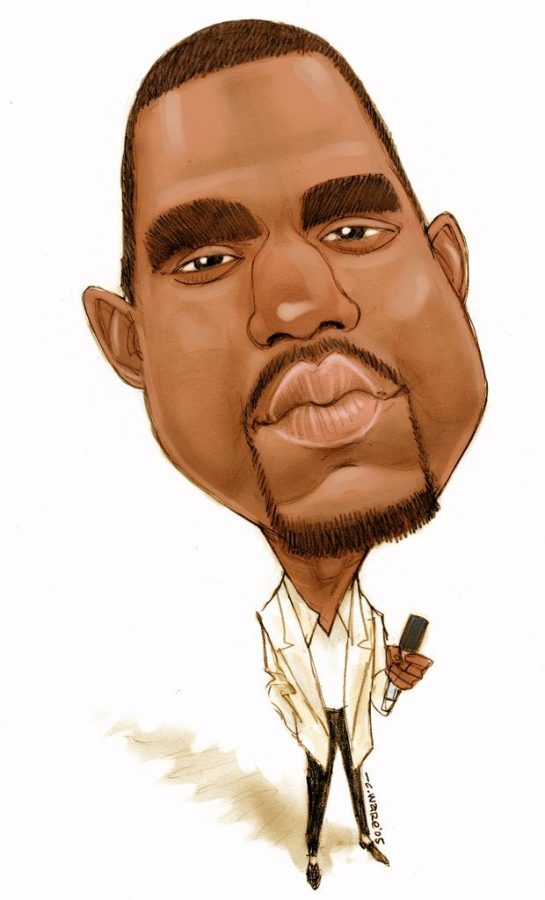Hip-hop’s most obsessive artist might be getting too finicky for his own good.
When Kanye West released his new album, “The Life of Pablo,” on Apple Music, Spotify and other streaming services on April 1, he brought along some revisions.
The album was initially released as a TIDAL exclusive, with Kanye going so far as to tweet that his album will “never never never be on Apple” back in mid-February. Only six weeks later, the album appeared on Apple Music and Spotify.
Although “TLOP” now joins the rest of Kanye’s collection on the more popular streaming services, Kanye made some edits — albeit minor ones — to many of the tracks on the album.
On “Wolves,” he added a thumping, repetitive snare drum over the vocals. On “Famous,” Kanye mixed in more vocal layering to Rihanna’s voice, and added minor tweaks to the Nina Simone sample. On “30 Hours,” the beat cuts out for a few random bars to add emphasis to the words, but the highlighted line isn’t all that significant. This new version of the album is standard across all streaming services.
The random, post-release edits beg a bigger question than simply, “Why?” Does Kanye still know what he’s doing?
The initial promise of TIDAL exclusivity has led to a class action lawsuit, claiming that TIDAL tricked users into signing up for the fledgling service under the promise that it would be the only place to stream “TLOP,” giving a boost to the faltering service with new subscriptions.
On April 18, Kanye made adjustments to 2013’s “Yeezus” as well, but only on Apple Music. The lead single “Black Skinhead” opens with a different vocal track and, like “30 Hours,” there are brief moments where the instrumental cuts out.
The changes to the beats, especially the thumping snare in “Wolves” make Kanye sound like a high school producer who’s just figuring out Fruity Loops, a basic beat-making program. Besides the changes to the verses on “Wolves,” what purpose does it serve to keep making such minor amendments, if they don’t add anything of sonic value to the songs?
The adjustments to some of the verses, like in “Famous” or “Ultralight Beam,” where one line gets swapped for another, are relatively easy to miss. The beat changes on songs like “Wolves,” “Famous” and “30 Hours” are unnecessary — the extra vocal layering, backing track removal and additional snares just complicate the songs, making them cacophonic glimpses into Kanye’s newfound creative process.
The additional verses by Sia and Vic Mensa on “Wolves” are fine and — according to some — superior to the original version that contained Kanye alone. The best part of the previous version of “Wolves” was the Frank Ocean outro, which has sadly been spun into its own song, that clocks in at under 40 seconds.
The album’s release on Apple Music and Spotify suggest that Kanye is content and that he’s finally finished the album — well after its original release.
Before the album was even released, it was obvious that this would be unlike any Kanye album that had preceded it. From the stream-of-consciousness tweeting that promoted the album — like the never-ending album title brainstorming and random insights into Kanye’s artistic inspirations — to the tracklist changes that occurred hours up until the album’s release, Kanye constantly kept us on our toes. His avant-garde debut of the album, the elaborate listening party and fashion show at Madison Square Garden, simply topped off the idiosyncratic unveiling.
Kanye’s album-making procedure with “TLOP” was different. If nothing else, Kanye deserves credit for being a talented musician, if for no other reason than his knack for delivering high quality, experimental, genre-bending albums. Each album has tackled completely new ground for Kanye, including one sung entirely in autotune, one that fuses classical music and rap and an album so minimalist and abrasive it almost hides the message.
When making “My Beautiful Dark Twisted Fantasy” during his exile to Hawaii in 2009, Kanye labored over every detail of the record, even claiming to have spent 5,000 hours just perfecting the song “POWER.”
The lyrics on Kanye’s past albums weren’t always at the same level of quality as the production, but they were better than they are now. Songs like “Feedback” and “Wolves” have verses that start out strong, and end with Kanye just repeating the first part of the verse. Each time it feels like he’s gaining momentum with a song, he just runs in place.
Kanye’s always been known for using his featured guests as much as he uses samples and instruments in his production. That is, he knows what an artist is good at and leverages that talent. The same Kanye who had mediocre rapper Rick Ross spit a legendary verse on “Devil in a New Dress,” only performs the outro in “30 Hours,” letting Andre 3000 take the lead. And the first Kendrick Lamar and Kanye collaboration features one of Kendrick’s most boring verses to date.
There are moments on the album where Kanye does what he does best: exploring new musical grounds and making them his own. His verse on “No More Parties in LA” combined with a slick Madlib beat brings out the best side of the new Kanye — arrogant and out-of-touch, but still slick and confident, with a dash of self-awareness. “Pt. 2” shows that he can still curate new talent, selectively showcase the best parts of his samples and, along with Desiigner, proves that he can make a mark in the trap game as well.
“TLOP,” from the constant changes and broad, non-existent focus, is not a Kanye West album. It’s a Kanye West mixtape, but it’s the best mixtape I’ve ever heard.



